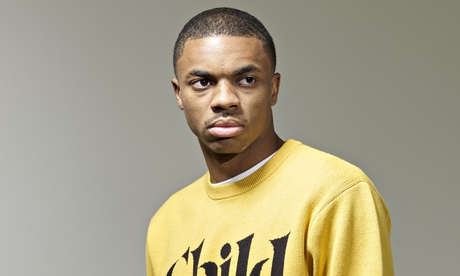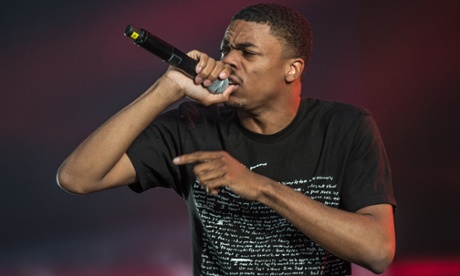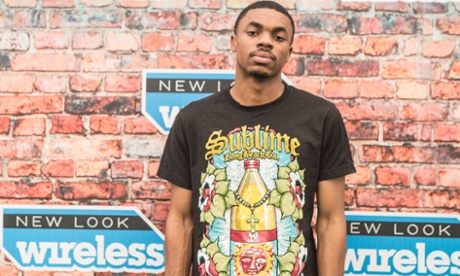Only nine months after his last record was released, Vince Staples is back with another. While the 28-year-old California rapper is known for his prolific output – he already has four albums under his belt, a further six mixtapes and EPs, and a host of features on other people’s tracks – even by his standards, that’s a rapid release schedule. Sitting on a Zoom call in a San Francisco hotel room, however, in a brief break before another date on his North American tour with Tyler, the Creator, Staples seems entirely unfazed. A little disinterested, if anything, in going through the requisite promo motions.
“It’s all good, man,” he says. “It’s all the same. We’ve been here before. I’m just trying to execute it, to bring the things we have planned to fruition.” His previous offering was self-titled; this one is called Ramona Park Broke My Heart, a nod to the Long Beach neighbourhood – just south of Los Angeles – that Staples was raised in. “Songs are just songs,” he states, when I ask if and how the two works relate. He doesn’t live far from the area today; there was no great return while he penned the album. “Home means the same to me as everybody else,” he says, vaguely. “The title is metaphorical: everyone knows home and heartbreak, those things affect your life no matter who you are.”
Staples’s disinclination to riff on the details feels a stark contrast from his approach in interviews past. He is known for his droll sense of humour, often answering questions with witty one liners, yet today he’s reserved and introspective. And while he has previously spoken about his early years in Ramona Park – the reality of the gangland violence and poverty that shaped his adolescence – now he’d rather let the record do the talking.
“I feel like a lot of the time,” says Staples, “we get this voyeurism: ‘Ah man, it must be so hard,’ or, ‘I can’t imagine growing up where you grew up, experiencing what you did.’ People look at us like we’re entertainment and not people. That’s how we look at rap music. That’s how we look at Black people.
“There’s perpetual violence,” he continues. “Our people constantly die. Meanwhile, we’re entertaining beefs and people’s misfortunes … We engage in trauma porn for people obsessed with poverty and violence who don’t know it, don’t digest it or really care about it.” Staples is tired of his music – and rap and hip-hop more broadly – being consumed only as entertainment at a surface level. It’s the industry – audiences and listeners alike – he argues, who giddily perpetuate the glamorisation and glorification of violence.“The truth is, someone can like my music,” Staples says, “but if I did one of these things that’s talked about in music for survival I would be shunned by the world.” Audiences will happily sing along, he says, until confronted with the reality. “But it happens every day,” he says. “We just don’t care about people like me and where I come from – we just pretend to.”
His discomfort is compounded by the fact that Staples doesn’t go in for the trappings of the A-list lifestyle. He doesn’t drink or do drugs. You won’t see him at celeb parties or awards ceremonies, never mixing his personal life with what he sees as business. Money may have alleviated the pressures on his family, but success doesn’t always sit right. “We like celebrity and ingenuity and people being rich and famous,” he says. “People won’t listen to folks off the street with the purest form of art and expression. It’s not about them. There’s only interest in you because of your status, something symbolic when you make it.”
There is no great divergence on the album when it comes to Staples’s lyrical dexterity: true to form, he explores complex ideas – from his relationship with violence to his struggles navigating the music business – with a sharpness, often in a tight two-minute runtime. He finds space to offer up a dose of vulnerability, too: “Money ain’t everythin’ / But I promise it help the pain”. Stylistically, it’s a visceral affair. The album’s first track – The Beach – opens with seaside sounds and mellow pop melodies. Sixty seconds later, it ends with a spray of gunshots.
While the rappers Lil Baby and Ty Dolla $ign and Mustard make feature appearances, it’s the other voices woven through the tracks that feel more resonant. Witnesses to and victims of violence speak on samples taken from news reports and DVDs. Some tracks are comprised solely of these recordings. There is audio of Monster Kody, later known as Sanyika Shakur, a one-time gang member turned activist and author. Another track, Nameless, is a clip of Cynthia Nunn, who founded a non-profit after losing loved ones to gang violence
: “You have to eat. You have to pay bills. You have to survive. So when you get used to pulling a trigger on somebody it’s not hard to pick up a gun and just shoot. You know? It’s not hard after a while.”
“All of these skits are from a long time ago,” Staples says. The samples were recorded in the 70s, 80s and early 90s. “They’re to show how circumstances and situations don’t really change as much as we like to pretend they do.” These people, he says, come from a similar place – geographically and in their experiences – to Staples and his family.
“Mostly they were interviewed and put on the news so people could ask: ‘Why are you the way you are?’” Staples says. “Nobody was asking why their circumstances are the way they are. As people listen to my songs, they might not understand that what I’m talking about is real life. It’s not entertainment. These voices matter. Them being heard might change how you hear my output.”
Staples expects a lot of himself, and his audience, too. He bemoans the shallowness of the way his music is often listened to, while he creates with precision and purpose: “People don’t understand nuance … Here’s this dude talking about the ghetto, again, but so much of this I’ve never spoken about before, with this perspective.”
Does that create some sort of tension for him in the industry? “Not at all,” he says. “I’ve never cared about what people make of what I’ve done. Each project is different. I cut myself off at the leg sometimes with the way I work: I don’t make my music for people who won’t understand it.”
Staples continues to diversify his creative output. As well as two records in 12 months, a graphic novel is due to be published later this year and he supports a YMCA programme; there’s also a Netflix show in production. Music may have been his entry point into the creative world – rapping required little in the way of resources – but he is far from precious about his stardom.
“All I have to speak about is myself in my music,” he says with total certainty. “I’m not well versed in anything else. As soon as that’s not enough for me to make music – or it no longer feels right – I’ll immediately stop doing it.”
Ramona Park Broke My Heart is out now on Blacksmith/Motown UK.











